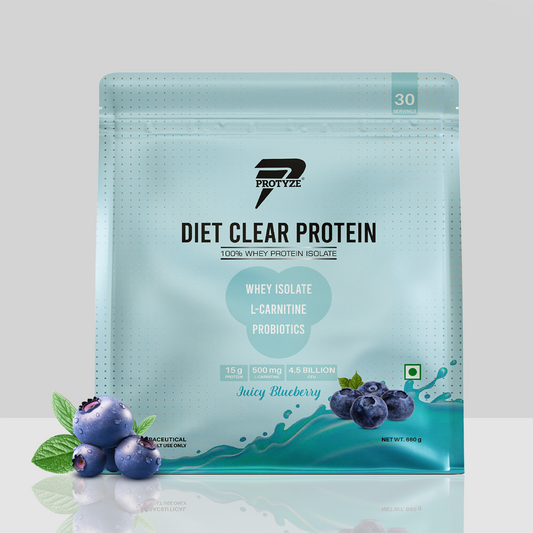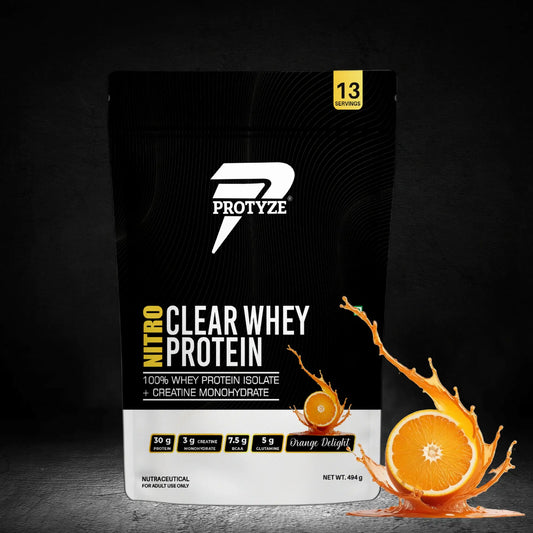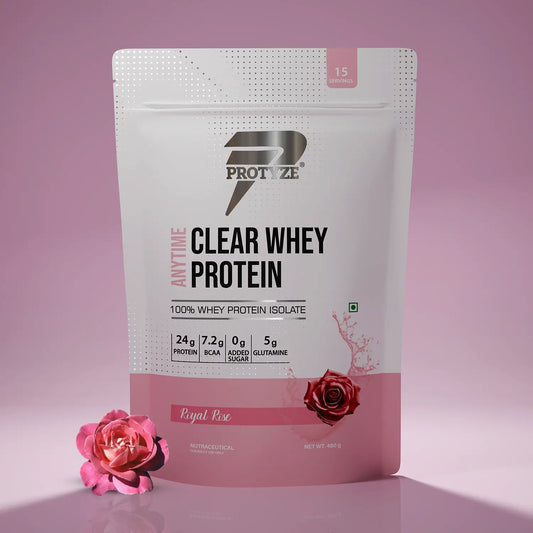Multivitamins are one of the most popular supplements worldwide, often marketed as a convenient way to fill nutritional gaps and support overall health. With busy lifestyles, processed foods, and varying dietary habits, many people turn to multivitamins to ensure they’re getting enough essential nutrients. But do you really need them? Are they a one-size-fits-all solution, or are they just an unnecessary expense?
This blog explores what multivitamins are, their benefits, potential drawbacks, who might need them, and how they fit into a balanced lifestyle. We’ll also highlight Protyze Diet Clear Whey Protein, a low-calorie, probiotic-enhanced protein supplement with flavors like Juicy Mango, to complement your nutritional needs. Whether you’re a fitness enthusiast, a busy professional, or simply curious about multivitamins, this article will help you make an informed decision about whether they’re right for you.
What Are Multivitamins?
Multivitamins are supplements that combine various vitamins and minerals in one convenient dose, typically in the form of tablets, capsules, gummies, or powders. They’re designed to provide a broad spectrum of essential nutrients that your body needs to function properly. A typical multivitamin might include:
- Vitamins: A, B-complex (B1, B2, B3, B5, B6, B7, B9, B12), C, D, E, and K.
- Minerals: Calcium, magnesium, zinc, iron, potassium, and trace elements like selenium or iodine.
These nutrients play key roles in supporting energy production, immune function, bone health, skin vitality, and more. The idea behind multivitamins is simple: they act as a nutritional safety net, helping to prevent deficiencies when your diet might not provide enough of these essentials. However, the question remains—does everyone need this safety net, or can a balanced diet do the job?
Benefits of Multivitamins
Multivitamins can offer several benefits, particularly for those who might not get enough nutrients through food alone. Here’s a closer look at what they can do:
- Fills Nutritional Gaps: If your diet lacks variety—perhaps you skip vegetables, avoid dairy, or eat a lot of processed foods—multivitamins can help ensure you’re getting key nutrients like vitamin D, B12, or iron.
- Boosts Energy and Focus: B vitamins (like B6 and B12) are crucial for energy metabolism, helping your body convert food into fuel. A multivitamin can support steady energy levels and mental clarity, especially if you’re low on these nutrients.
- Supports Immunity: Vitamins C, D, and zinc are known to strengthen the immune system, helping you fight off infections. This can be especially helpful during seasons when colds are common or if you’re under stress.
- Promotes Bone Health: Many multivitamins include calcium, vitamin D, and magnesium, which work together to maintain strong bones and reduce the risk of fractures, particularly as you age.
- Improves Skin, Hair, and Nails: Vitamins A, C, E, and biotin (B7) support healthy skin, hair growth, and nail strength by promoting collagen production and protecting against oxidative stress.
- Reduces Fatigue: If you’re low on iron or B12, you might feel tired or weak. A multivitamin can help address these deficiencies, giving you a natural energy lift.
While these benefits sound promising, multivitamins aren’t a magic fix. Their effectiveness depends on your individual needs, diet, and lifestyle.
Potential Drawbacks of Multivitamins
Multivitamins aren’t without their downsides. Understanding these can help you decide if they’re worth adding to your routine:
- Not a Substitute for a Healthy Diet: Multivitamins can’t replace the complex nutrients, fiber, and antioxidants found in whole foods like fruits, vegetables, and lean proteins. Relying on them instead of eating well misses out on the full benefits of a balanced diet.
- Risk of Overdose: Taking too much of certain nutrients, like vitamin A, D, or iron, can be harmful. For example, excess iron can cause stomach issues, while too much vitamin D can lead to high calcium levels in the blood, affecting your kidneys. Always stick to the recommended dose.
- Not Always Absorbed Well: Some multivitamins contain nutrients in forms that your body doesn’t absorb easily, or they include competing nutrients (e.g., calcium and iron) that reduce absorption when taken together.
- May Not Be Necessary: If you already eat a varied, nutrient-rich diet, you might not need a multivitamin. For example, if you regularly consume fatty fish, fortified dairy, and leafy greens, you’re likely getting enough vitamin D, calcium, and other essentials.
- Cost vs. Benefit: High-quality multivitamins can be expensive, and if you don’t have a deficiency, the money might be better spent on whole foods or targeted supplements like vitamin D or omega-3s.
The key is to assess whether a multivitamin addresses a real need in your life, rather than taking it just because it’s popular.
Who Might Need Multivitamins?
While multivitamins aren’t essential for everyone, certain groups may benefit more than others. Here’s who might find them helpful:
- People with Dietary Restrictions: If you’re vegan, vegetarian, or have food allergies (e.g., dairy or gluten intolerance), you might miss out on nutrients like B12, iron, or calcium, which are often found in animal products. A multivitamin can help fill these gaps.
- Busy Professionals or Students: If your schedule leaves little time for balanced meals, you might not get enough vitamins and minerals. A multivitamin can act as a backup to ensure you’re not deficient.
- Older Adults: As you age, your body absorbs nutrients less efficiently, and dietary needs change. For example, older adults often need more vitamin D and calcium for bone health, or B12 due to reduced stomach acid production.
- Pregnant or Breastfeeding Women: During pregnancy and breastfeeding, nutrient needs increase significantly—especially for folate (B9), iron, and calcium—to support fetal development and maternal health. A prenatal multivitamin is often recommended, but always consult a doctor.
- Athletes or Active Individuals: Intense exercise increases your need for nutrients like B vitamins (for energy), magnesium (for muscle function), and antioxidants (to combat exercise-induced stress). A multivitamin can support recovery and performance.
- Those with Deficiencies: If blood tests show you’re low on specific nutrients—like vitamin D, iron, or B12—a multivitamin can help correct this, though targeted supplements might be more effective in some cases.
If you fall into one of these groups, a multivitamin might be a good addition to your routine. However, it’s always best to consult a healthcare provider to confirm your needs through testing or dietary analysis.
Do You Really Need a Multivitamin?
The answer depends on your individual circumstances. Here’s how to decide:
Signs You Might Need a Multivitamin
- Fatigue or Low Energy: If you’re always tired despite sleeping well, you might be low on B vitamins, iron, or vitamin D.
- Frequent Illness: Getting sick often could indicate a weak immune system, potentially due to low levels of vitamin C, D, or zinc.
- Poor Skin, Hair, or Nails: Brittle nails, thinning hair, or dull skin might suggest deficiencies in biotin, vitamin A, or E.
- Dietary Gaps: If you rarely eat fruits, vegetables, or other nutrient-dense foods, you’re at risk of deficiencies.
- Specific Health Conditions: Conditions like anemia (low iron) or osteoporosis (low calcium/vitamin D) may warrant a multivitamin or targeted supplements.
Signs You Might Not Need One
- Balanced Diet: If you eat a variety of whole foods—fruits, vegetables, whole grains, lean proteins, and healthy fats—you’re likely getting most of what you need.
- No Symptoms of Deficiency: If you feel energetic, rarely get sick, and have no signs of nutrient shortages, a multivitamin might not add much value.
- Already Taking Targeted Supplements: If you’re already taking specific supplements like vitamin D or omega-3s, a multivitamin might overlap and lead to excess intake.
The best way to know for sure is to assess your diet and lifestyle, and consider a blood test to check for deficiencies. A healthcare provider can help you decide if a multivitamin is necessary or if you’d benefit more from specific nutrients.
How to Choose a Quality Multivitamin
If you decide a multivitamin is right for you, quality matters. Here’s what to look for:
- Third-Party Testing: Choose brands that test for purity and potency, ensuring the label matches what’s in the bottle.
- Balanced Formula: Look for a multivitamin that provides close to 100% of the Recommended Dietary Allowance (RDA) for most nutrients, avoiding mega-doses that can be harmful.
- Bioavailable Forms: Opt for nutrients in forms your body can absorb well, like vitamin D3 (cholecalciferol) over D2, or methylcobalamin for B12.
- Tailored to Your Needs: Some multivitamins are formulated for specific groups, like women, men, seniors, or athletes. Pick one that matches your age, gender, or lifestyle.
- Minimal Additives: Avoid products with artificial colors, sweeteners, or fillers that might cause sensitivities.
A good multivitamin should complement your diet, not replace it. It’s also helpful to pair it with other healthy habits, like consuming protein-rich options such as Protyze Diet Clear Whey Protein, which provides 15g of protein and probiotics to support digestion and overall wellness.
Integrating Multivitamins into a Healthy Lifestyle
To get the most out of a multivitamin, it should be part of a broader approach to health that includes balanced nutrition, regular exercise, hydration, and rest. Here’s how to make it work:
Nutritional Synergy
Eat Nutrient-Dense Foods
- Focus on whole foods to maximize your nutrient intake:
- Fruits and Vegetables: Berries, spinach, broccoli, and oranges for vitamins A, C, and K.
- Lean Proteins: Chicken, fish, eggs, and tofu for B vitamins and iron.
- Healthy Fats: Avocados, nuts, and olive oil for vitamin E and omega-3s.
- Whole Grains: Oats, quinoa, and brown rice for B vitamins and fiber.
Protein Support
- Include a light protein source like Protyze Diet Clear Whey Protein (15g protein, 99% lactose-free, Juicy Litchi flavor) post-workout or as a snack to support muscle recovery and gut health with its probiotic content.
Macronutrient Balance
- Aim for:
- Carbs: 2-4g/kg body weight (120-240g for 60kg) from fruits, vegetables, and grains.
- Protein: 1.2-2.0g/kg (72-120g for 60kg) from whole foods and clear whey.
- Fats: 0.5-1g/kg (30-60g for 60kg) from nuts, seeds, and fish.
Exercise and Activity
- Strength Training: 3-5 sessions/week (45-60 min) with exercises like squats, lunges, or push-ups to leverage protein and B vitamins for muscle growth and energy.
- Cardio: 150-300 min/week of moderate activity (e.g., brisk walking, cycling) to support heart health, aided by nutrients like magnesium and potassium.
- Flexibility: 1-2 yoga or stretching sessions/week to reduce stress, enhancing the calming effects of B vitamins and magnesium.
Hydration and Recovery
- Hydration: Drink 2.2-3L water daily to support nutrient absorption and overall health, with clear whey shakes contributing to fluid intake.
- Sleep: Aim for 7-9 hours nightly to allow your body to use nutrients for repair and recovery.
- Stress Management: Practice 5-10 min of deep breathing or meditation daily to lower cortisol, helping vitamins like C and B-complex support your nervous system.
Sample Daily Plan (60kg Person)
- Morning: 30 min yoga, oatmeal with berries, 2 eggs, multivitamin with breakfast.
- Mid-Morning: Protyze Diet Clear Whey Protein (15g protein, Juicy Blueberry) with 200ml water, banana.
- Lunch: Grilled chicken, quinoa, spinach, glass of fortified almond milk (vitamin D).
- Afternoon: 45 min strength training, Protyze Diet Clear Whey (Juicy Mango) post-workout.
- Snack: Greek yogurt, almonds, apple.
- Dinner: Salmon, sweet potato, kale, glass of water.
- Evening: Herbal tea, 10 min stretching, 8 hours sleep.
- Daily: 2.5L water, balanced meals.
- Timeline: Improved energy and immunity in 2-4 weeks; better overall vitality in 8-12 weeks.
Common Mistakes to Avoid with Multivitamins
- Over-Reliance: Don’t use multivitamins as an excuse to eat poorly. They’re a supplement, not a replacement for whole foods.
- Ignoring Dosages: Taking more than the recommended dose can lead to toxicity, especially with fat-soluble vitamins like A, D, E, and K.
- Not Timing Properly: Some nutrients, like iron, are best absorbed on an empty stomach, while others, like fat-soluble vitamins, need food. Check the label for guidance.
- Skipping Medical Advice: If you have health conditions or take medications, a multivitamin might interact (e.g., vitamin K with blood thinners). Consult a doctor first.
- Expecting Quick Fixes: Multivitamins work best over time to correct deficiencies, not as an instant energy boost. Be patient and consistent.
Conclusion
Multivitamins can be a helpful tool for filling nutritional gaps, supporting energy, immunity, and overall wellness—but they’re not for everyone. If you have a balanced diet and no signs of deficiency, you might not need one. However, for those with dietary restrictions, busy lifestyles, or specific health needs, a quality multivitamin can provide a safety net to ensure you’re getting essential nutrients.





